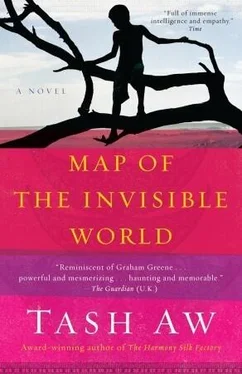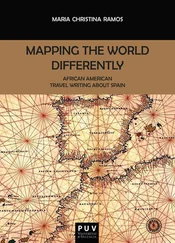Tash Aw - Map of the Invisible World
Здесь есть возможность читать онлайн «Tash Aw - Map of the Invisible World» — ознакомительный отрывок электронной книги совершенно бесплатно, а после прочтения отрывка купить полную версию. В некоторых случаях можно слушать аудио, скачать через торрент в формате fb2 и присутствует краткое содержание. Год выпуска: 2010, Издательство: Spiegel & Grau, Жанр: Современная проза, на английском языке. Описание произведения, (предисловие) а так же отзывы посетителей доступны на портале библиотеки ЛибКат.
- Название:Map of the Invisible World
- Автор:
- Издательство:Spiegel & Grau
- Жанр:
- Год:2010
- ISBN:нет данных
- Рейтинг книги:4 / 5. Голосов: 1
-
Избранное:Добавить в избранное
- Отзывы:
-
Ваша оценка:
- 80
- 1
- 2
- 3
- 4
- 5
Map of the Invisible World: краткое содержание, описание и аннотация
Предлагаем к чтению аннотацию, описание, краткое содержание или предисловие (зависит от того, что написал сам автор книги «Map of the Invisible World»). Если вы не нашли необходимую информацию о книге — напишите в комментариях, мы постараемся отыскать её.
comes an enthralling novel that evokes an exotic yet turbulent place and time—1960s Indonesia during President Sukarno’s drive to purge the country of its colonial past. A page-turning story,
follows the journeys of two brothers and an American woman who are indelibly marked by the past — and swept up in the tides of history.
Map of the Invisible World — читать онлайн ознакомительный отрывок
Ниже представлен текст книги, разбитый по страницам. Система сохранения места последней прочитанной страницы, позволяет с удобством читать онлайн бесплатно книгу «Map of the Invisible World», без необходимости каждый раз заново искать на чём Вы остановились. Поставьте закладку, и сможете в любой момент перейти на страницу, на которой закончили чтение.
Интервал:
Закладка:
REPATRIATION CONTINUES
JAKARTA, 6 December 1950—The repatriation of Dutch families from Indonesia is continuing in earnest. Numbers of Dutch nationals leaving Indonesia are estimated to be on the increase. Today a special KLM flight left from Halim Perdana Kusumah airport filled with the latest families departing for the Netherlands. Most of them are happy to be leaving Indonesia, just as we are that they are leaving. Photo: Mother and child wait to board plane. Isn’t that a cute Teddy Bear! Don’t cry, Teddy Bear!
REVOLT IN AMBON
AMBON, 16 January 1951—Following the disbanding of the colonial army in July last year, a small number of former soldiers have refused to join the new armed forces of Indonesia. It is estimated that no more than 40 of these traitors have turned down the chance to participate in President Sukarno’s building of the great Republic of Indonesia and arrangements have been made to ship them away to the Netherlands. “I have to leave my family behind and I will be very lonely in the Netherlands, but I have no future in Indonesia,” says one of these traitors whom we will only call Tomy. To Tomy and his friends we say, Good Riddance!
DEATH IN THE PLANTATIONS
Special Report by Affandi Suprianto
NUSA PERDO, 2 December 1953—In this little-known corner of Indonesia a war is being fought to rid the country of the last vestiges of Dutch colonialism. On a 200-hectare Kayuputih plantation … a battle that symbolizes the hardship of ordinary Indonesians … neoslavery and oppression … Following the death of his daughter Santi, aged 4, plantation worker Adrus Utina … concession-owner Joos van Eerde … funeral costs … pleas unanswered … misunderstanding … subsequent dismissal … fellow workers protested … all rewarded with dismissal … burning of warehouses … accidental shooting … ultimatum … following morning the van Eerde family fled the com pound … plantation under the control of the workers’ cooperative … revolution beginning even in outlying islands …
MY WONDERFUL LIFE:
Renowned Artist Jos Smit Talks About Heartache and Happiness
BALI, 19 January 1957—He has had successful exhibitions in Sumatra and his beloved Bandung, and his reputation is now sky-high. Collectors of his work are said to include the president himself, but acclaimed artist Jos Smit’s career would never have begun if he had not come to Indonesia. Now settled in Bali, he is convinced that he has found his spiritual home. “I suppose for me it is what Tahiti was to Gauguin — beautiful colors and light, not like the gray gray gray of Holland…. Tradition of painting … many famous Westerners, Spies and Bonnet, whom everyone knows but other minor figures like Karl de Willigen too.” As for his nationality, he is utterly sure that he made the right choice, even though he sometimes feels sad for the loss of friends. “I took an Indonesian passport as soon as I could, in 1950. All other Dutch Indonesians should have done the same but they didn’t have the courage. I had no hesitation. For nearly ten years I have only spoken Bahasa Indonesia. I can’t even speak Dutch anymore! The only regret I have is that sometimes I speak to people and I can see in their eyes that they think I’m Dutch, not Indonesian.” When asked about other former Dutch contacts who might still be in Indonesia, such as de Willigen, he says, “I have had no contact with them for years. They are probably all back in Holland, or else dead.”
UNITED STATES PEACE PROGRAMME—
Aid Package for Indonesian Army
JAKARTA, 6 September 1958—Photo: President Sukarno attends reception at U.S. Embassy in Jakarta (L — R, the president, Ambassador Howard P. Jones, General Nasution).
Margaret examined the hazy image. In the background there hovered a number of people, including the unmistakable figure of Bill Schneider, his already thinning hair neatly combed, eyes alert, watching every detail. He looked exactly the same as he did today; clearly life in the tropics suited him.
She rubbed her eyes. It was getting late, the room darkening quickly in the blue twilight. She rearranged the newspapers haphazardly and went to find the librarian. The reception desk was empty, cleared completely of papers and books. “Hello,” Margaret called, but no one answered. The swiftlets that nested in the eaves of the roof were coming alive in the gathering dusk, fluttering from their nests in search of insects. Margaret left the building and began the long walk home. Her head no longer hurt and she felt ready to face the city.
She walked through the narrow alleys of Glodok, the air filled with the aroma of incense and cooking and blocked drains: a powerful, even heady combination. Never go there at night, foreigners cautioned, but Margaret always found it pleasant, especially in the evenings. The ceaseless sounds of human industry — the clatter of pans and dishes, the dull thud of sacks unloading from lorries, the indistinct clinking of hardware — comforted her, for in the half darkness it was easy to imagine that here, in this warren of streets, the city had not changed in two hundred years. Trapped in the maze of dead ends and unnamed streets, she could not see tower blocks or concrete monuments or glass statues; and under the cover of night the decay of the buildings around her became less noticeable, making the city seem gentler, more human.
Farther north the old square was quiet and empty now, the colonnades of the great buildings filled with a deep gloom. The soldiers she had seen earlier were gone, replaced by people trying to find a place to sleep. Suddenly she was eager to get home and glad she was not far. She longed for a cold shower, a modern American one with powerful jets of water that would strip the dust and grime from her hair and face and make her skin tingle when she stepped into it, but instead she knew that she would have to stand under the dribble of her makeshift shower that consisted of a hose and a watering can. The water would be tepid, heated in its thin pipe by the sun, but still, it would be good enough. And then she would have a whiskey, a strong one, and then she would fall asleep and forget about today, about everything.
She hurried along the final stretch until she reached the low wooden gate in front of her house. She could hear the distant ringing of her telephone as she fumbled in the dark for her keys, running across the yard. It was not until she was almost at the front door that she realized there was someone there, a body slumped on the steps. It was a boy, a teenager, crouched over in an almost fetal position. Margaret got closer and saw that he was asleep. Disturbed by the insistent ring of the telephone, he began to stir. He shifted uncomfortably; across his white T-shirt the word BERKELEY was emblazoned in large letters. Though closed, his eyelids trembled lightly, rapidly, as if troubled by dreams.
6
O ne day, not long after he turned thirteen, Adam ran away from home. He woke up that morning and decided he would look for his mother.
For some weeks before this he had been feeling strange, not at all himself. He would be agitated by the smallest thing: the mewing of the fat white cat outside his window, or the squeaking of his bed frame every time he turned over on the too-thin mattress, or his closet door that never closed properly — things he would not normally have noticed. He was irritated by Karl too — by his uneven club-footed gait, by the pinky whiteness of his skin, which seemed obtrusive against the dull green landscape, and, above all, by the way Karl sometimes mumbled to himself: indistinct words in an indistinct language under his breath without even realizing he was doing it. “Was I talking to myself again?” Karl would say, clearing his throat and attempting to laugh whenever he noticed Adam glaring at him. “Just a silly poem I remember from a long time ago.” But it did not matter what he said, for Adam would try to ignore him, but as soon as the dreadful half whisper started, Adam felt a curious sensation in his head, a pinprick that welled up quickly into a hot, almost burning feeling that filled his skull, pressing especially insistently behind his eye sockets. He would no longer be able to read or concentrate on what he was doing and would be so overcome by this pressure in his head that he would have to retreat to his bedroom. There, on his bed with his pillow over his face, he would still hear Karl’s voice.
Читать дальшеИнтервал:
Закладка:
Похожие книги на «Map of the Invisible World»
Представляем Вашему вниманию похожие книги на «Map of the Invisible World» списком для выбора. Мы отобрали схожую по названию и смыслу литературу в надежде предоставить читателям больше вариантов отыскать новые, интересные, ещё непрочитанные произведения.
Обсуждение, отзывы о книге «Map of the Invisible World» и просто собственные мнения читателей. Оставьте ваши комментарии, напишите, что Вы думаете о произведении, его смысле или главных героях. Укажите что конкретно понравилось, а что нет, и почему Вы так считаете.












